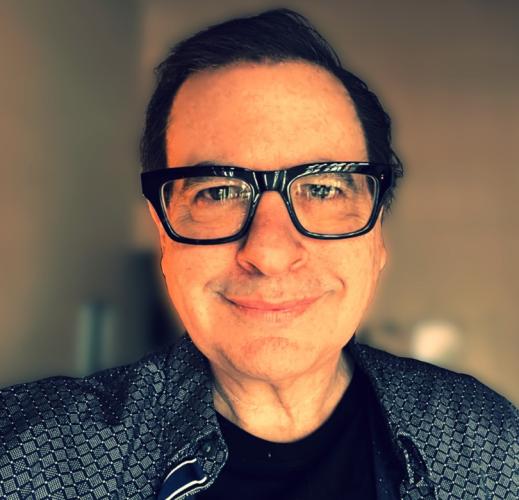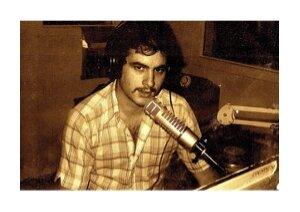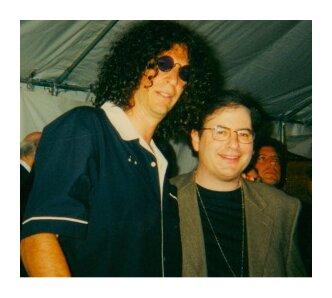
Dave Morgasen’s passion for radio led to Ohio University and WOUB and eventually a career writing comedy in Hollywood

When David Morgasen was graduating from high school in 1974, he was looking for a college that would give him an opportunity to gain hands-on experience in radio broadcasting.
“I was really into radio. I always thought that I wanted to be a disc jockey on the radio. I grew up in New York listening to DJs in the nation’s biggest radio market,” said Morgasen. “So I was looking for a school that had a real strong broadcasting program and Ohio University was at the top. With WOUB available for students, Ohio University was really impressive.”
Almost as soon as he arrived in Athens, Morgasen got involved at WOUB. Because at the time freshman weren’t permitted to be on the air during their first quarter, Morgasen started out as a weekend supervisor. That meant that he was in the Radio and TV Building on the weekends to “keep an eye on things.”
“They gave you this giant key ring with every key imaginable,” said Morgasen with a chuckle. “I couldn’t believe they were trusting me, a kid, to be in charge of anything. But that’s one of the things I loved about working at WOUB, the trust they put in you. They put me in charge of very expensive equipment and that responsibility meant a lot.”

By the time winter quarter rolled around, Morgasen thought he was ready to go on the air. But the program director wouldn’t give him an air shift.
“Since I was from New York, the program director told me that I had to ‘get rid of that funny accent’ before I could go on the air,” said Morgasen. “He suggested I go to the university’s speech and hearing center. But I didn’t need to do that. I worked on it on my own, and my accent went away.”
The radio and television major eventually got his on-air shift, but during his time at WOUB, discovered that his real love was on the production side of radio.
“At WOUB, you could sign out a studio for hours and I would play around,” said Morgasen. “I would also be assigned to write and produce promotional spots. And that’s where I started experimenting with comedy writing.”
After graduation, Morgasen started his career in radio production and by the time he was 24 years old, he was was the production director at a station in New York City.
“That was because of my training at WOUB.”
However, after a few years, Morgasen got restless. He realized he also wanted to work in visual media and made the jump to working for advertising agencies.
“From there I started writing radio comedy bits that were syndicated nationwide,” said Morgasen. “They were commercial parodies and things like that.”
Morgasen started his own company pairing his love of producing media and writing comedy.
“I started making corporate comedy,” said Morgasen. “I created training videos and other content for companies that were funny. I basically had a comedy troupe that did corporate meetings and training videos.”
And at the same time, Morgasen was writing film scripts, and eventually sold one to Warner Brothers.
“The film was never made. That happens a lot. Studios buy scripts, but never end up making the film,” said Morgasen. “But the check still cleared.”
That sparked a move to Hollywood. About one year after Morgasen arrived in LA, he got an agent and started writing for TV specials.
“It was surreal,” said Morgasen. “I was writing comedy bits for things like the American Comedy Awards where in one broadcast, I got to write for Jerry Seinfeld, Eddie Murphy and Dick Van Dyke.”

In 1999, Morgasen wrote a script for a TV show called "Son of the Beach" which was picked up by FX. Produced by Fox Television Studios in conjunction with Howard Stern Productions, the "Bay Watch" parody was on the air for three years and became a cult hit.
“The show helped put Fox's FX Network on the map when their target demographic was Males 18-34.”
Morgasen went on to write for MGM, HBO, Disney and Yahoo. He was also a field director for "Jimmy Kimmel Live."
“WOUB put me on the path to being a writer,” said Morgasen. “WOUB was my first opportunity to write comedy. I wrote hundreds of promotional spots for WOUB and most of them were comedic in nature. I’d write it and produce it. Then the next day hear it on the air. It was such a thrill for me to do that. I was confident knowing I could do this. WOUB gives you the opportunity to meet your potential. It’s that sensibility that I have carried with me my entire career.”
